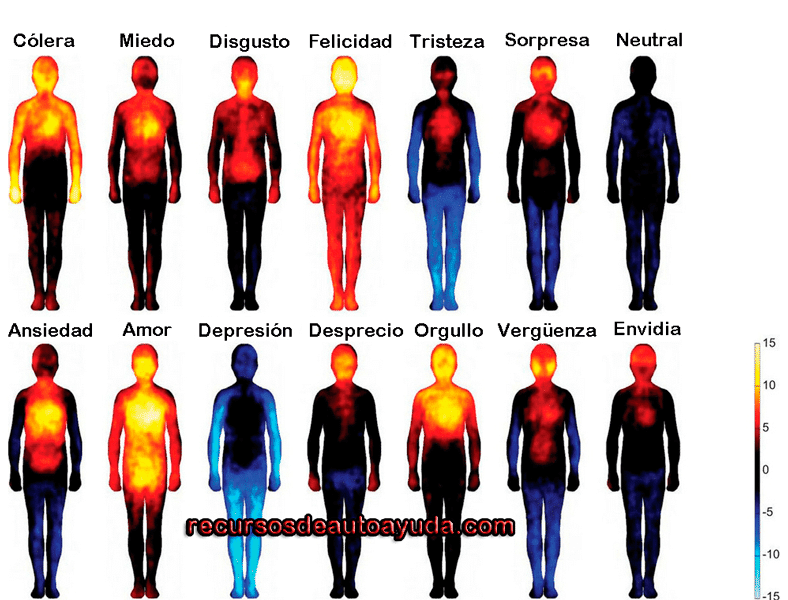
Emotions are actually neither positive nor negative. They are simply emotions and each and every one of them is important to people. Emotions help us understand how we feel, how we are, and above all, what we should do to be better if we are not, or what to do to stay well if we have a good emotional balance.
Although it is true that to understand them better, we classify them as positive or negative emotions, because that way we can better understand which ones make us feel good and which ones bad. Being positive emotions those that make us feel better, and negative emotions those that make us feel worse.
We all have emotions
We all experience emotions from an early age. As adults try to navigate the often chaotic world of modern life, the range of emotions we experience in a day can change dramatically. Our ability to feel and respond to our emotions is often taken for granted.

We rarely stop to think and pay close attention to what we feel. We do not consider the impact it has on our mental and physiological states, or the long-term implications of holding onto emotions, which could be detrimental to us.
In this sense, it is important to understand what negative emotions are and why they are necessary in our life and in our day to day.

What are negative emotions
It is important to distinguish between what is an emotion and what is a feeling. While the two are interconnected, there is a bigger difference than you realize.
Emotions
Emotions are considered "lower level" responses. They first occur in the subcortical areas of the brain, such as the amygdala and ventromedial prefrontal cortices. These areas are responsible for producing biochemical reactions that have a direct impact on your physical state..
Emotions are encoded in our DNA and are believed to have been developed as a way to help us respond quickly to different environmental threats, much like our "fight or flight" response. The amygdala has also been shown to play a role in the release of neurotransmitters that are essential for memory, so emotional memories are often stronger and easier to remember.
Emotions have a stronger physical basis than feelings, which means that researchers find it easier to measure them objectively through physical signals such as blood flow, heart rate, brain activity, facial expressions, and body language.

Feelings
Emotions are seen as prior feelings, which tend to be our reactions to the different emotions that we experience. Where emotions can have a more generalized experience in all humans, feelings are more subjective and are influenced by our personal experiences and interpretations of our world based on those experiences.
Feelings occur in the neocortical regions of the brain and are the next step in how we respond to our emotions as individuals. Because they are so subjective, they cannot be measured like emotions.
Psychologists have long explored the range of human emotions and their definitions. Eckman identified six initial basic emotions:
- Anger
- Asco
- Fear
- Felicidad
- Sadness
- Surprise
He later expanded this to include eleven other basic emotions:
- Fun
- Contempt
- Contentment
- Shame
- Emotion
- Guilt
- Pride
- Alivio
- Satisfaction
- Sensory pleasure
- Shame
There is a denomination since 2003 on negative emotions that says the following:
"As an unpleasant or unhappy emotion that is evoked in people to express a negative effect towards an event or person." By reading Eckman's list of basic emotions, it is fairly easy to determine what could be termed "negative" emotions.
While we can use the negative label, with what we know about emotions, it is important to recognize that all emotions are completely normal to experience. They are part of our ingrained DNA. The most important thing is to understand when and why negative emotions can arise, and develop positive behaviors to address them.
What are the effects of negative emotions?
While it is important to understand that negative emotions are a healthy part of life, there is a downside to giving them too much free reign. If you spend too much time thinking about negative emotions and the situations that could have caused them, you could go into a rumination spiral.
Rumination is the tendency to keep thinking, repeating, or obsessing over negative emotional experiences and situations. In this negative thinking spiral, you may end up feeling worse about the situation and yourself. The result could be a series of detrimental effects on your mental and physical well-being.

The problem with rumination is that it increases your brain's stress response circuitry, which means that your body is unnecessarily flooded with the stress hormone cortisol. There is considerable evidence that this is a driver for clinical depression.
The tendency to ruminate is linked to a number of harmful coping behaviors, such as overeating, smoking, and alcohol consumption, along with physical health consequences including insomnia, high blood pressure, cardiovascular disease, and clinical anxiety and depression.
Additionally, people who gave up on prolonged rumination after a negative emotional experience took longer to recover from the physiological impact of the experience. Rumination can be a difficult escape, especially since most people do not realize that they are stuck in the rut of rut and believe that they are actively solving problems. This can lead to other implications for mental and physical well-being.
Negative emotions should not be eliminated, since they are part of life and part of us. But it is important that they be learned from them in order to move forward and above all, to have enough will to give us the necessary and sufficient impulse to do things in a way that we feel better. Emotions help us to be better and to recognize when we must change things. Emotions make us human and help us to know ourselves better.